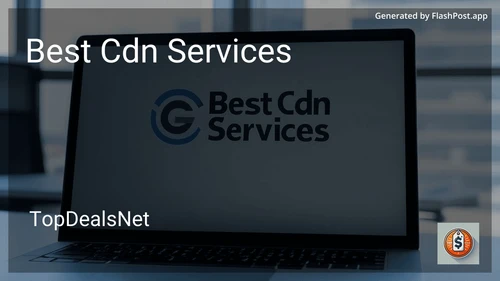Best CDN Services in February 2026

Cloudflare
- [Global CDN
- Web application firewall
- DDoS protection
- SSL/TLS encryption
- Load balancing]

Akamai
- [Global server network
- Media delivery
- Security services
- Site acceleration
- Data analytics]

Amazon CloudFront
- [Global CDN
- Real-time metrics
- Customizable rules
- Integration with AWS services
- HTTPS support]

Fastly
- [Real-time content delivery
- Edge computing
- Advanced caching
- Video and Streaming delivery
- Web security]

StackPath
- [Content Delivery Network
- Edge computing
- Web application firewall
- DDoS protection
- Global platform]

Microsoft Azure CDN
- [Global CDN
- Dynamic site acceleration
- Video streaming
- Security features
- Customizable controls]
In the increasingly digital world, ensuring that your website delivers fast and reliable performance is crucial. One of the most effective ways to enhance website speed and user experience is by leveraging a Content Delivery Network (CDN). In this article, we explore the fundamentals of CDN services and provide insights on how to choose the best CDN for your needs.
What is a CDN?
A Content Delivery Network (CDN) is a network of servers distributed across various geographical locations. The primary function of a CDN is to deliver content, such as images, videos, and other web assets, to users with high efficiency and low latency.
By caching content closer to users, a CDN can significantly reduce the time it takes for web pages to load. This not only enhances user experience but also improves the overall performance of the website. CDNs are essential for websites with high traffic volumes, as they help to evenly distribute server load and prevent slowdowns during peak times.
Why Use a CDN?
Improved Load Times
CDNs drastically reduce the time it takes for content to travel from the server to the user's browser. By storing copies of web assets on multiple servers worldwide, CDNs ensure that users access content from a location closest to them, thereby minimizing latency.
Enhanced Reliability and Availability
CDNs provide redundancy, meaning if one server in the network fails, another can take over seamlessly to ensure content delivery is not interrupted. This redundancy increases the reliability and availability of your website, providing a stable experience for users.
Scalability
As your website grows, managing increased traffic efficiently becomes critical. CDNs are designed to handle high volumes of traffic without compromising performance, making them an ideal solution for scalability challenges.
Better Security
Many CDNs offer security features such as DDoS protection, secure token authentication, and encryption. These features help safeguard your website against malicious attacks and ensure data integrity is maintained throughout content delivery.
Factors to Consider When Choosing a CDN
Selecting the best CDN service for your website requires careful consideration of several factors:
Geographic Coverage
The effectiveness of a CDN largely depends on its geographic coverage. Ensure the CDN service has a widespread network of servers in locations where your audience is concentrated. This will help accelerate content delivery to users regardless of their geographic location.
Performance Metrics
Evaluate the performance metrics offered by the CDN provider, including average load times, error rates, and cache hit ratios. These metrics offer insights into how effectively the CDN can deliver content and enhance user experience.
Customization Options
Look for a CDN that offers configuration flexibility, such as custom caching rules, support for different file formats, and adjustable expiration times. The ability to tailor settings to your specific needs can optimize content delivery.
Ease of Integration
Choose a CDN that integrates smoothly with your existing website infrastructure and technologies. Compatibility with content management systems (CMS) and ease of use in terms of setup and management can significantly reduce deployment time and complexity.
Cost and Plans
Cost is an important consideration when selecting a CDN service. Analyze the pricing models and various plans to ensure they align with your budget and expected traffic volumes. Keep an eye out for any additional fees that may be incurred.
Customer Support
Reliable customer support is essential, especially in case of technical issues. Assess the quality and availability of support provided by the CDN vendor to ensure you receive prompt assistance when needed.
Conclusion
Choosing the best CDN service involves evaluating your website's specific needs and considering factors like geographic coverage, performance, customization, integration, cost, and support. By carefully assessing these criteria, you can select a CDN that enhances your website's performance, reliability, and security, ultimately providing an improved user experience. With the right CDN, your website will be well-equipped to handle increased traffic and maintain optimal functionality across diverse user environments.
